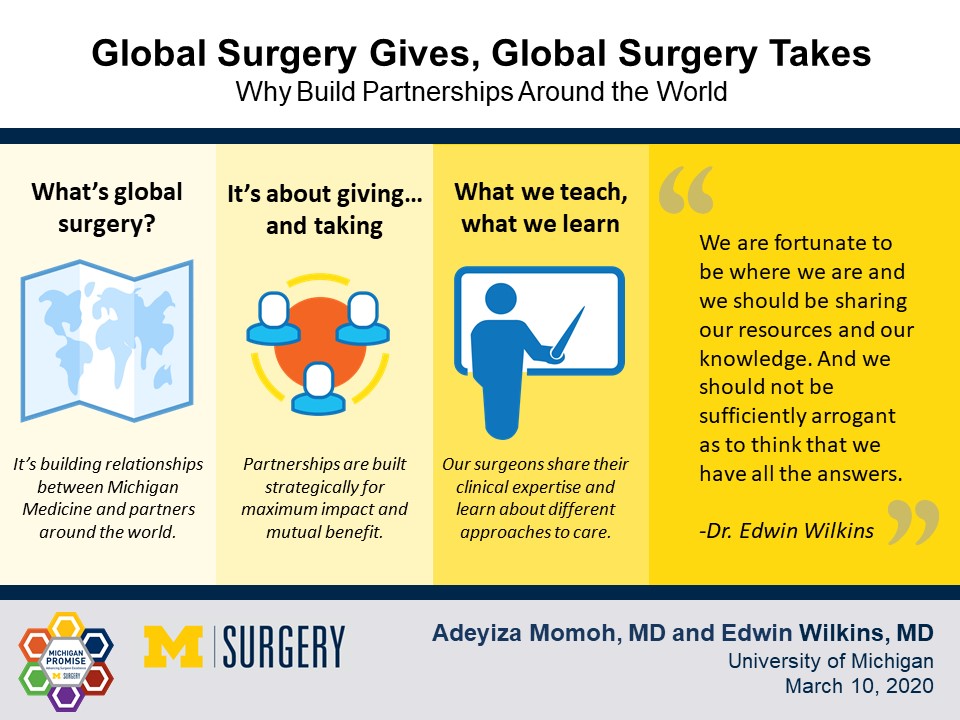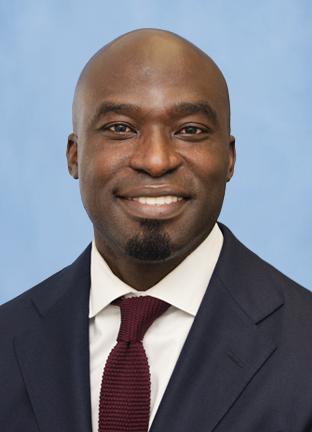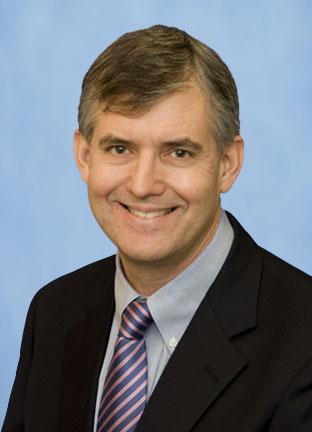
Addis Ababa, Ethiopia is a world away from Ann Arbor, Michigan. What bridges the two places, besides a flight, is the reach of Michigan Medicine’s Surgery Department.
Dr. Edwin Wilkins and Dr. Adeyiza Momoh recently traveled to St. Paul’s Hospital Millennium Medical College in the Ethiopian capital to explore helping a team start a fellowship for post-mastectomy breast reconstruction surgery.
The global surgery relationship started like a blind date: Word of mouth traveled to a contact of Momoh’s that the hospital was interested in starting the program. That contact set the hospital up with Momoh and Wilkins, who’d partnered with other institutions around the world for similar work.
Why go global
What does breast reconstruction in Ethiopia have to do with the Michigan Medicine— and what is global surgery? Stripped down to its core, it’s about building relationships between the University of Michigan and partners around the world.
The section of plastic surgery currently has established partnerships in Brazil, Colombia, Ghana, Ukraine and Taiwan. Such partnerships are undertaken strategically because the best ones are mutually beneficial: Where is there opportunity for significant impact, what expertise can our surgeons share, and what can we learn?
“You have to go and sit down and listen. It’s kind of like a first date. Are we right for each other? Is this a good fit? Can each partner provide what the other is looking for?” Wilkins said.
In the case of the potential partnership with St. Paul’s Hospital Millennium Medical College, Michigan Medicine sees research potential. Momoh is interested in evaluating the impact of breast reconstruction on quality of life, for example.
He also sees an opportunity to have an impact on outcomes. The breast reconstruction program would be among the first if not the first in the country
“On the surface, this work could be viewed as a luxury in the sense that might lack other basic necessities of life and we’re talking about breast reconstruction, but the reality is it can have a profound impact on quality of life after breast cancer,” he said.
Momoh pointed out that women in the Ethiopian population, like many others in Sub-Saharan Africa, may reject standard breast cancer treatment for fear of the disfigurement and social stigma that comes with a mastectomy. Because of that delay in seeking care, mortality is higher. If women knew that breast reconstruction was an option, might they be more likely to seek treatment earlier, and see better survival outcomes?
What we give, what we take
Global surgery partnerships usually involve Michigan Medicine surgeons sharing their expertise and educating other clinicians. Surgeons return to Michigan with more than souvenirs in the form of lessons they can implement close to home.
An open mindset is key to successful partnerships, Wilkins said: “It’s not the great University of Michigan marching in there and telling them what to do.”
Wilkins reflected on lessons learned from trips to India, where he observed clinics handling 700 patients a day, and was struck by their sophistication and effectiveness. Even with a lack of technology and relatively few staff resources, outcomes were often equivalent to those in the US.
“Going to places that are more resource-challenged to see how people rely on their skills as providers and not as much on technology is a real eye-opener. That’s why I want us to send our trainees overseas: To find out that there are different ways to do things and you don't automatically have to go with the most elegant, complicated, expensive option to help somebody,” Wilkins said.
Continuing the less-is-more theme, the recent Ethiopia visit showed Momoh that some patients might find certain information excessive and overwhelming, ultimately undermining the diagnosis and treatment conversations.
“We learned that sometimes the information they are interested in learning might be slightly different than what women in North America might be keen on. We are learning to communicate differently with patients of a different background,” Momoh said.
Since Michigan Medicine surgeons see patients from many different backgrounds and geographic locations, those conversational styles can translate to patients in Michigan.
Wilkins has also seen implications for modeling more efficient systems back home. On his previous trips to India, for example, he noted how the workload was distributed. Specialists were less likely to be engaged for routine tasks that providers with less training but sufficient skills could carry out:
“It’s truly a team approach. They spread the work around a lot more than we do and they deliver a high level of care. Having a team of people, many whom don’t have M.D. after their names, is OK and in fact it’s the only way you can get through a clinic with 700 people.”
Wilkins took that lesson home.
“I’m a control freak but you have to let go a little bit and let people do their jobs and let people grow a little bit in their jobs,” he said.
Because it’s the right thing to do
There is give and take in the partnerships, and each one is carefully considered, but altruism should not be ignored, Wilkins said.
“We have a social responsibility to do this rather than just sit home and take care of people lucky enough to live here. We are fortunate to be where we are and we should be sharing our resources and our knowledge. And we should not be sufficiently arrogant as to think that we have all the answers. There are people around the world who have other answers, better answers.”
##
By Colleen Stone
Downloads

Adeyiza O. Momoh, MD

Edwin G. Wilkins, MD
Contact Us
Connect with the Department of Surgery to share your ideas or get in touch.
Department of Surgery
2101 Taubman Center
1500 E. Medical Center Dr.
Ann Arbor, MI 48109
Email: [email protected]
Twitter: @UMichSurgery
